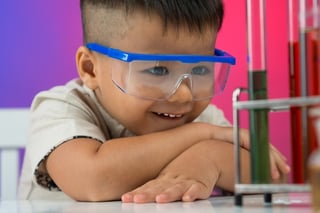What to Expect from Science Education in Transitional Kindergarten
Does your child qualify for Transitional Kindergarten? If you are hoping your child will be interested in STEM careers, you may wonder what to expect from the science education in Transitional Kindergarten (TK). While there is not a set curriculum across the state, here are some things you can expect:
 Science That Follows the Common Core Standards
Science That Follows the Common Core Standards
While no state mandated Transitional Kindergarten curriculum has been developed, TK follows Common Core State Standards for kindergarten. That means that the science your child learns in TK will help them prepare for what they will need to know in the future. The Common Core kindergarten standards include:
- Learning to observe objects using the five senses.
- Understanding time, seasons and the different types of plants and animals on earth.
- Measuring, observing and predicting how materials will react and change.
Interdisciplinary Science Activities
One of the hallmarks of the Transitional Kindergarten classrooms is the integration of subjects. That means that children study the science of whales by:
- Reading books about different kinds of whales.
- Studying the difference between whales and fish.
- Drawing whales.
- Telling stories about whales or using whale puppets.
Integrated learning across all content areas helps children to absorb more information, think analytically and remember better.
Science Learning Centers
Transitional Kindergarten also emphasizes play-based learning by doing, just like Kids Konnect. The TKCalifornia project suggests that teachers use learning centers as a major organization tool of the classroom. A science learning center allows children to:
- Explore science ideas with real materials.
- Complete science experiments in their own time frame.
- Work alone or with someone else.
Parent Involvement in Science
Another hallmark of the Transitional Kindergarten curriculum is that parents are involved in the learning process. For science education, that can mean that parents and children:
- Do simple science experiments at home.
- Take children to the zoo, California Academy of Sciences or Exploratorium.
- Read books about science.
- Look for science in daily life.
Will Transitional Kindergarten Help My Child Learn Science?
Probably so. Research shows that children who attend additional preparation before kindergarten have more confidence, academic skills and social maturity along with learning key concepts. Having your child attend a play-based preschool like Kids Konnect and Transitional Kindergarten assures that they will be ready for elementary school. What other questions do you have about Transitional Kindergarten?
